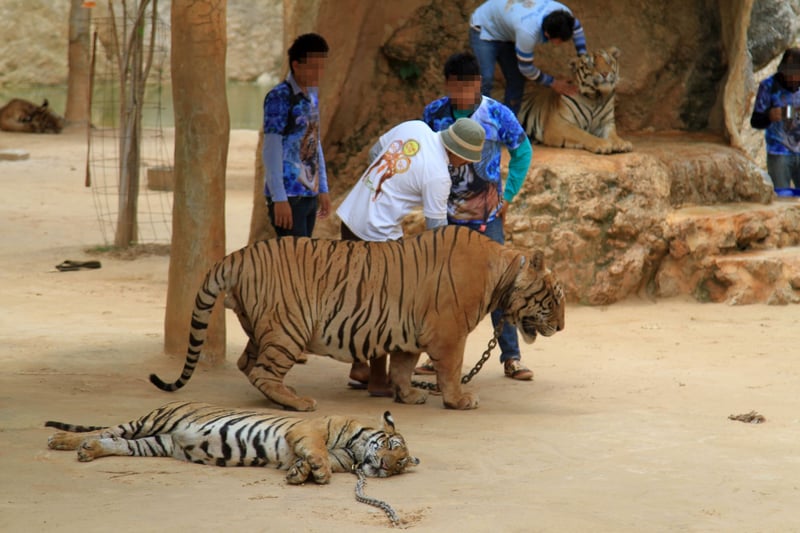
More than 212,000 people call on Thai authorities to stop cruel tiger venue opening
Press release
World Animal Protection’s petition of more than 212,000 signatures was handed to Thailand’s Department of National Parks, Wildlife and Plant Conservation (DNP) to stop the opening of a tourist attraction where tigers are at risk of horrific cruelty, trafficking and breeding for profit
A recent investigation by international animal welfare charity, World Animal Protection exposed that the company behind the controversial Tiger Temple is planning to open a new venue beside the old one under the company’s new name Golden Tiger (Thailand) Co. Ltd.
Shocking revelations showing photos of small old fashioned tiger cages being constructed across four hectares of land have raised fears that the new wildlife tourist attraction will open by the end of May 2017.
The new tiger venue is operated by the same company that jointly operated the infamous Tiger Temple – a once well-known tourist attraction which faced allegations of illegal breeding and trafficking of tigers and their body parts. In May of 2016, more than 500 officers from Thailand’s Department of National Parks, Wildlife and Plant Conservation (DNP) raided the venue, uncovering dead cubs in freezers alongside tiger skins, amulets and tiger teeth trinkets.
Dr. Jan Schmidt-Burbach, senior wildlife advisor at World Animal Protection says:
"History of cruelty to tigers cannot repeat itself again under a different name. We must ensure that this venue does not open. We urge the authorities to listen to the many thousands of people who have petitioned to prevent this senseless plan.
“We came so far to stop cruelty to tigers and their illegal trade when the Tiger Temple was closed last year. We cannot fall back to the unacceptable scenario of cubs being bred for profit, separated from their mothers, small enclosures, limited veterinary care, stress and injury, all of which cause extreme suffering.”
Golden Tiger (Thailand) Co. Ltd, which is constructing the new venue in Kanchanaburi (in the West of Thailand) is still to meet 11 specified conditions for being allowed to open, but these are failing to ban breeding or tourist interactions with tigers at the proposed new venue.
In addition, legal cases and police investigations into the illegal wildlife trade allegations against Tiger Temple are still ongoing, and permitting the company behind this attraction to open a new venue would allow them to continue running a tiger business that potentially harbours cruelty.
Last year World Animal Protection released a study on tigers used for entertainment in Thailand which documented a 33% increase in the number of tigers at tourism facilities over a five-year period.
The main welfare concerns witnessed by the investigators at these tourist venues include:
- Tiger cubs cruelly separated from their mothers, two to three weeks after they are born
- Young cubs used as photo props with tourists; constantly viewed and mishandled hundreds of times a day, which can lead to stress and injury
- Tigers being punished to stop aggressive unwanted behavior. One staff member told our researchers that starvation is used to punish the tigers when they make a ‘mistake’
- Most tigers were housed in small concrete cages or barren enclosures with limited access to fresh water. Fifty percent of the tigers we observed were in cages with less that 20sqm per animal, a far cry from the 16-32km they would roam in a single night in the wild
- One in ten (12%) of the tigers we observed showed behavioral problems, such as repetitive pacing and biting their tails. These behaviors most commonly occur when animals feel they cannot cope with stressful environments or situations.
Find out more about our campaign: https://www.worldanimalprotection.org/wildlife-not-entertainers
Notes to editors:
For an interview with a spokesperson, contact Kai Akram kaiakram@worldanimalprotection.org, +44 (0) 7939 029 006.
Since January 2017, we have written two letters to the DNP to not issue a license to the Golden Tiger Co. Ltd and impose a breeding ban.
The tiger crisis in Thailand is increasing; the 147 tigers confiscated by the DNP from the tiger temple raid in 2016 are still being cared for by DNP.
Read our report about Thailand’s tiger entertainment industry.
Visit our campaign site for more information on wild animals used for tourist entertainment.